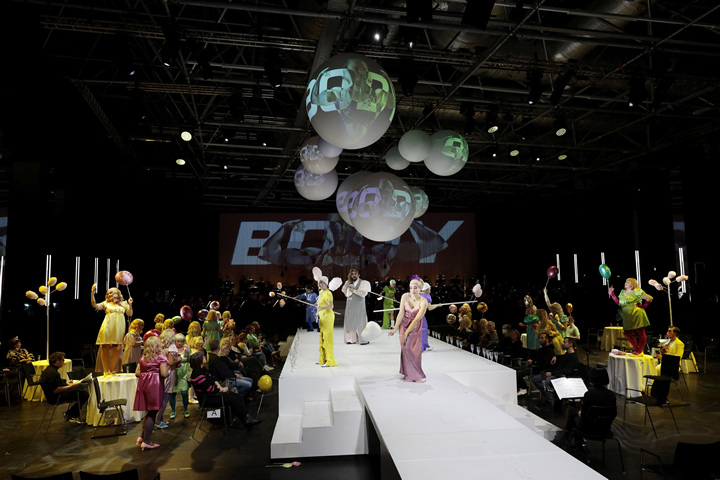| Opera Reviews | 3 May 2024 |
A new production of Der Zwerg marks the work's hundredth anniversaryby Silvia Luraghi |
|
Zemlinsky: Der Zwerg
|
|

Ensemble
|
|
|
The home building of Cologne Opera dates back only to the 1950s, but it has been closed for renovation for ten years already. After performing at different venues, the company is now in its seventh season at the Staatenhaus am Rheinpark in the Trade Fair area. The building still looks provisional in its function of replacement for a proper opera theater, but the re-opening of the old house, which was planned for the end of the current year, still looks some time away as the budget for renovation has reached one billion euros. In the meantime, the company management is trying their best to attract attention. One of the highlights of the current season is the new production of Alexander Zemlinsky’s opera Der Zwerg (‘The Dwarf’) in a double bill with Igor Stravinsky ballet Petruschka, on the occasion of the one-hundredth anniversary of the opera, which had its world premiere in Cologne in 1922, staged in the same double bill (for Stravinsky's ballet it was at that time the company premiere). For this production, stage director Paul-Georg Dittrich supported by set and costume designers Pia Dederichs and Lena Schmid and video-maker Konrad Kästner, set the Infanta’s birthday in a pop setting, with friends and courtesans in fancy party clothes, while the videos partly projected on balloons obsessively advertised beauty treatments. The story of the ugly dwarf who didn’t know about his repulsive looks was framed as a case of body shaming prompted by a compulsive maniac attitude toward bodily perfection. In this perspective, the protagonist was not an ugly creature, but simply didn’t meet the beauty standards of the ferocious and mocking party girls. The stage extended to the central aisle between the orchestra seats, and some members of the audience who were sitting on the sides of the stage were also recruited as party participants, showing cards with presents for the Infanta and sipping some complimentary champagne. All the singers were making their role debut. They followed the stage director’s instructions with commitment, and did their best with the vocal score. Tenor Burkhard Fritz has a number of Wagner roles in his repertoire and was certainly a good choice for the title role being able to negotiate the demanding tessitura. He was also very compelling as a puzzled fellow who takes the Infanta’s words earnestly and couldn’t understand what was really going on around him. Soprano Kathrin Zukowski was a wild and nasty Infanta Donna Clara, while soprano Claudia Rohrbach as her best friend Ghita made an effective contrast, being the only one to show some concern about the dwarf’s feelings. Bass Christoph Seidl was a malicious Don Estoban, the organizer of the cruel trick. The short ballet Petrushka, which was choreographed by Richard Siegal with the same production team as Zemlinsky’s one-act opera, was intended as a further episode of harsh behavior toward an outcast, and was a nice conclusion for the frenzy performance. The Gürzenich-Orchester Köln was skillfully conducted by Maestro Lawrence Renes. The performance was very successful, and both the singers and the production team received applause and cheers.
|
|
| Text ©
Silvia Luraghi Photo © Paul Leclaire |
|







